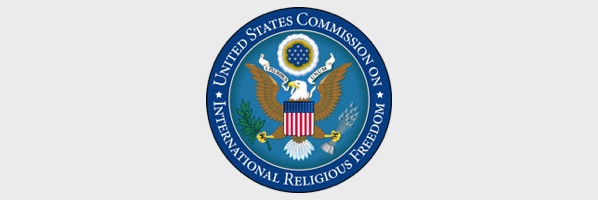April 29th 2021 | Massimo Introvigne | BitterWinter
The USCIRF Report.
In the last few days, two important documents highlighted the sad status of religious liberty in China and other countries.
USCIRF, the U.S. Commission on International Religious Freedom, is an independent, bipartisan U.S. federal government commission created by the 1998 International Religious Freedom Act (IRFA). Its Commissioners are appointed by the President and by Congressional leaders of both political parties.
USCIRF’s 2021 Annual Report recommends 14 countries to the State Department for designation as “countries of particular concern” (CPCs) for their serious violations of religious liberty. These include 10 already designated as CPCs by the State Department in December 2020—Burma, China, Eritrea, Iran, Nigeria, North Korea, Pakistan, Saudi Arabia, Tajikistan, and Turkmenistan—and four others—India, Russia, Syria, and Vietnam.
The 2021 Annual Report also recommends 12 countries for placement on the State Department’s Special Watch List (SWL) as violators of religious liberty. These include two already on the list—Cuba and Nicaragua—and 10 others—Afghanistan, Algeria, Azerbaijan, Egypt, Indonesia, Iraq, Kazakhstan, Malaysia, Turkey, and Uzbekistan. USCIRF noted improvements in the religious liberty situation of Bahrain, the Central African Republic (CAR), and Sudan, which were among its SWL recommendations in the 2020 Annual Report but are not designated for the SWL in 2021.
About a country Bitter Winter has regularly investigated in the last few months, the USCIRF notes that “religious freedom conditions in Pakistan continued to worsen. The government systematically enforced blasphemy and anti-Ahmadiyya laws and failed to protect religious minorities from abuses by nonstate actors. There was a sharp rise in targeted killings, blasphemy cases, forced conversions, and hate speech targeting religious minorities including Ahmadis, Shi’a Muslims, Hindus, Christians, and Sikhs.”
The USCIRF asks the Biden administration to toughen its stance on Russia as one of the world’s worst violator of religious liberty, stating that, “In 2020, religious freedom conditions in Russia deteriorated. The government continued to target ‘nontraditional’ religious minorities with fines, detentions, and criminal charges. Russian legislation criminalizes ‘extremism’ without adequately defining the term, enabling the state to prosecute a vast range of nonviolent religious activity.”
The USCIRF also notes that criticism of the Russian Orthodox Church is often treated as blasphemy, and reports “Russia to have the world’s third-highest number of criminal blasphemy cases, behind Pakistan and Iran. [USCIRF] also found that Russia led the world in criminal blasphemy enforcement cases related to social media.” The report summarizes the harsh persecution of Jehovah’s Witnesses in Russia, and refers to the USCIRF’s earlier document on the Russian international promotion of the anti-cult movement. It notes that, for example, under Russian influence, in Kazakhstan Scientologists “in Nur-Sultan were required to attend ‘preventative consultations,’ where they were threatened and ordered to sign a statement denouncing and disavowing Scientology.”
The section on China discusses the notorious transformation through education camps, and notes that Chinese authorities “have sent millions of Muslims to these camps for wearing long beards, refusing alcohol, or exhibiting other behaviors deemed signs of ‘religious extremism.’ Former detainees reported torture, rape, sterilization, and other abuses in custody. Experts raised concerns that the Chinese government’s ongoing actions in Xinjiang could amount to genocide under international law. Reports also highlighted the use of Uyghur forced labor in internment and prison camps, factories, and industrial parks in the region. Moreover, authorities continued to carry out large-scale closures and destruction of Uyghur religious sites.”
The CCP continued in 2020, the report says, its “pervasive control and suppression of Tibetan Buddhism,” and independent Christianity. The USCIRF notes that “despite the Vatican-China agreement on Bishop appointments, Chinese authorities continued to harass, detain, and torture underground Catholic bishops,” as they did with Protestant house church pastors, and quoted Bitter Winter on the destruction of churches, crosses, and Buddhist and Daoist statues and temples.
On themes familiar to readers of Bitter Winter, the USCIRF reiterates that, “The 2018 Revised Regulations on Religious Affairs effectively ban all ‘unauthorized’ religious teachings and expand the role of local authorities in controlling religious activities. Under Article 300 of the Chinese Criminal Code, simply belonging to certain religious movements, such as the Falun Gong or The Church of Almighty God, is punishable with three to seven years’ imprisonment—or up to life imprisonment for cases the authorities deem more serious.”
More details about the persecution of Protestant house churches, not part of the government-controlled Three-Self Church, and Catholic conscientious objectors who refuse to join the Patriotic Catholic Church even after the Vatican-China Deal of 2018, are offered by the Annual Persecution Report 2020 published by the well-known NGO ChinaAid.
The report notes that the COVID crisis was one of the factors making the persecution worse, as surveillance was increased under the pretext of fighting the pandemic. “There was no social distancing from the persecution,” said ChinaAid’s President, Dr. Bob Fu.
2020, ChinaAid notes, was the third year of Xi Jinping’s five-year plan for the sinicization of Chinese Christianity. Although state-run churches part of the Three Self Church were also harassed, and compelled to include more “patriotic” and pro-CCP material in their sermons and services, it became increasingly clear that sinicization is aimed at destroying the independent activities of the House Churches. The report indicates that 100% of the House Churches were harassed or persecuted in 2020. All the House Church movement main leaders were summoned and questioned by the police, and some were arrested.

Commentaires récents